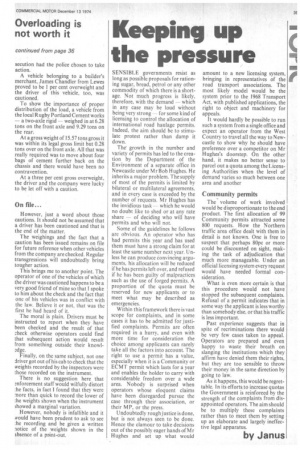Keeping up the pressure
Page 41

If you've noticed an error in this article please click here to report it so we can fix it.
SENSIBLE governments resist as long as possible proposals for rationing sugar, bread, petrol or any other commodity of which there is a shortage. Not much progress is likely, therefore, with the demand — which in any case may be loud without being very strong -for some kind of licensing to control the allocation of international road haulage permits. Indeed, the aim should be to stimulate protest rather than damp it down.
The" growth in the number and variety of permits has led to the creation by the Department of the Environment of a separate office in Newcastle under Mr Bob Hughes. He inherits a major problem. The supply of most of the permits is limited by bilateral or multilateral agreements, and in every case is exceeded by the number of requests. Mr Hughes has the invidious task — which he would no doubt like to shed or at any rate share — of deciding who will have permits and who will not.
Some of the guidelines he follows are obvious. An operator who has had permits this year and has used them must have a strong claim for at least the same number next year. Unless he can produce Convincing arguments, his allocation will be reduced if he has permits left over, and refused if he has been guilty of malpractices such as the use of forged permits. A proportion of the quota must be reserved for new applicants or to meet what may be described as emergencies.
Within this framework there is vast scope for complaints, and in some cases it has to be admitted for justified complaints. Permits are often required in a hurry, and even with more time for consideration the choice among applicants can rarely take all the factors into account. The right to use a permit has a value, especially when it is a Community or ECMT permit which lasts for a year and enables the holder to carry with considerable freedom over a wide area. Nobody is surprised when operators whose eloquent claims have been disregarded pursue the case through their association, or their MP, or the press.
Undoubtedly rough justice is done, but is not always seen to be done. Hence the clamour to take decisions out of the possibly eager hands of Mr Hughes and set up what would amount to a new licensing system, bringing in representatives of the road transport associations. The most likely model would be the system prior to the 1968 Transport Act, with published applications, the right to object and machinery for appeals.
It would hardly be possible to run such a system from a single office and expect an operator from the West Country to travel all the way to Newcastle to show why he should have preference over a competitor on Mr Hughes's doorstep. On the other hand, it makes no better sense to parcel out a quota among the Licensing Authorities when the level of demand varies so much between one area and another
Community permits
The volume of work involved would be disproportionate to the end product. The first allocation of 99 Community permits attracted some 800 requests. How the Northern traffic area office dealt with them in detail is not known. One is free to suspect that perhaps 80pc or more could be discounted on sight, making the task of adjudication that much more manageable. Under an official licensing system every request would have needed formal consideration.
What is even More certain is that this procedure would not have stopped the subsequent complaints. Refusal of a permit indicates that in some way the applicant is less worthy than somebody else, or that his traffic is less important.
Past experience suggests that in spite of recriminations there would be very few cases taken to appeal. Operators are prepared and even happy to waste their breath on slanging the institutions which they affirm have denied them their rights, but they are too sensible to throw their money in the same direction by going to law.
As it happens, this would be regrettable. In its efforts.to increase quotas the Government is reinforced by the strength of the complaints from disappointed operators. The aim should be to multiply these complaints rather than to meet them by setting up an elaborate and largely ineffective legal apparatus.
by Janus




























































































